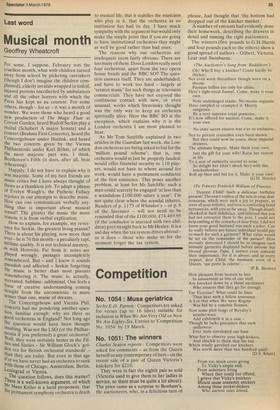Musical month
Geoffrey Wheatcroft
For some, I suppose, February was the cruellest month, what with children turned away from school by picketing caretakers (though I don't imagine the children complained), elderly invalids wrapped in tinfoil, Injured persons uncollected by ambulances and all the other horrors with which the Press has kept us au courant. For some Others, though — for us — it was a month of wonder. We were those who heard a good new production of The Magic Flute at Covent Garden, heard Rudolf Serkin play a recital (Schubert A major Sonata) and a concert (Brahms First Concerto), heard the Concertgebouw under Haitink, and heard the two concerts given by the Vienna Philharmonic under Karl Biihm, of which the most majestic part was, I think, 13eethoven's Fifth (it does, after all, bear rehearsing).
Happily, I do not have to explain why it was majestic. Some of my best friends are music critics but I have always thought of theirs as a thankless job. To adapt a phrase Of Evelyn Waugh's, the Pathetic Fallacy rejoices in our attempts to describe music. Row can one communicate verbally anything that is important about musical sound? The greater the music the more remote it is from verbal explication. How to explain, for example, my reverence for Serkin, the greatest living pianist? There is about his playing, now more than ever— he is 76 this month— a peculiarly rapt, sublime quality. It is not technical mastery, as with Horovitz. Far from it: notes are Played wrongly, passages incompletely remembered. But — and I know it sounds Pseudish and affected — Serkin forgetting the music is better than most pianists remembering it. The music is, actually, recreated. Sublime: subliminal. One feels a force of creative understanding coming straight from the unconscious: in more senses than one, music of dreams. The Concertgebouw and Vienna Phil. Concerts had me pondering another question, familiar enough: why are there no Sod orchestras in England? Not long ago !he question would have been thought Insulting. Was not the LSO (or the Philhar!tonic if you preferred) a great orchestra? Yell, they were certainly better in the Fifties and Sixties — Sir William Glock's 'golden era for British orchestral standards' — than they are today. But even in that age d or we have never had an orchestra to rank With those of Chicago, Amsterdam, Berlin, Leningrad or Vienna. The question follows, does this matter? There is a well-known argument, of which mr Hans Keller is a lucid proponent, that the Permanent symphony orchestra is death to musical life, that it stultifies the musicians who play in it, that the orchestra as an institution has had its day. I have much sympathy with the argument but would only make the simple point that if you are going to have institutional orchestras they might as well be good rather than bad ones.
The reasons why our orchestras are inadequate seem fairly obvious. There are too many of them. Does London really need four orchestras, apart from the two opera house bands and the BBC SO? The question answers itself. They are underfunded, and have to work too hard — largely at 'session music' for such things as television commercials. They have not enjoyed the continuous contact with new, or even unusual, works which Stravinsky thought was the only way to keep an orchestra spiritually alive. Here the BBC SO is the exception, which explains why it is the London orchestra I am most pleased to hear.
As Mr Tom Sutcliffe explained in two articles in the Guardian last week, the London orchestras are being asked to bid for the 'million pound scheme'; that is, one orchestra would at last be properly funded, would offer financial security to 110 players, would not have to whore around for work, would have a permanent conductor of the first eminence. This poses another problem, at least for Mr Sutcliffe: such a man could scarcely be engaged 'at less than a scandalous £100,000 salary a year'. I'm not quite clear where the scandal inheres. Readers of p. 1173 of Whitaker's — or p. 6 of the Spectator — will not need to be reminded that of the £100,000, £74,469.95 (if the conductor is married with two children) goes straight back to Mr Healey. It is a sad day when the tax system drives abroad — as it does — those who make us for the moment forget the tax system.


































 Previous page
Previous page